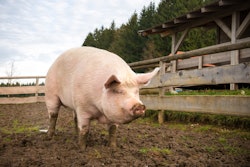
In the latest development in Vietnam's long-running battle to control the spread of African swine fever (ASF), the disease has recently recurred in central Vietnam.
Bearing the brunt of this battle recently has been the province of Nghe An, according to VietnamNet. With more than 100 confirmed outbreaks in 17 districts, up to 8,000 pigs are reported to have been culled. In order to control the spread of the virus, provincial authorities have provided disinfectant, equipment and other resources.
As well as Nghe An, outbreaks have also occurred recently in three provinces in the north of the country, and three more in the Mekong Delta region in the south.
Since the country’s first cases were recorded in February of 2019, the same source reports that the disease spread rapidly to all 63 of Vietnam’s cities and provinces within seven months. Six million pigs were culled — equivalent to 20% of the national swine population.
From this peak in 2019, Vietnam has recorded a subsequent decline in ASF outbreaks. Totals were 1,256 in 2022, and 576 so far in 2023. This is according to the latest update on the ASF situation in Asia from the United Nations’ Food and Agriculture Organization (FAO; dated December 21).
In July 2023, Vietnam authorized the world’s first ASF vaccines for use in pigs.
Further outbreaks confirmed in Hong Kong
Surveillance of premises in the Special Administrative Region of Hong Kong has revealed a further seven cases of ASF in pigs.
These were identified at a licensed farm during the third week of December, according to the latest official notification to the World Organisation for Animal Health (WOAH). As in the previous three outbreaks since the end of October, the farm to be affected was located in the Yuen Long district in the New Territories.
More than 8,500 domestic pigs were directly impacted by the outbreaks at the first three farms.
Subsequently, Hong Kong’s agriculture department reported a further outbreak in the territory on December 28. Around 1,100 pigs were scheduled for culling after 20 samples from the farm tested positive for the ASF virus. The affected premises was also in Yuen Long.
Local farmers have been alerted to this development. Officials are carrying out inspections at the eight other pig farms within 3 kilometers of the latest outbreak.
ASF returns to Philippines province
At the end of December, an executive order was introduced in most of the communities in the town of Silago. This bans the slaughtering of hogs and the sale of live pigs or pork products in these communities for a period of at least one month, reports the Philippine News Agency (PNA). Furthermore, movements of the animals and their products to other areas are prohibited.
This “emergency situation” is being applied to the town, which is located in Southern Leyte, a province in the Eastern Visayas region. The ASF virus was last detected in Silago in 2021.
Elsewhere in the Philippines, the province of Negros Occidental is counting the cost of a series of ASF outbreaks that started in April 2023.
Formerly one of the country’s leading provinces for backyard hog production, losses are estimated to have reached PHP200 million (US$3.6 million) by October. More than 18,000 pigs died in 20 provincial communities over that period, although not all of these are attributed to ASF.
Across the country, there are active ASF cases in six regions, according to the Bureau of Animal Industry (as of December 29). This is three fewer than the update one month previously. Since its first detection in 2019, ASF outbreaks have occurred in all 17 regions of the Philippines, and in 72 of its 82 provinces.
ASF developments elsewhere in Asia
In Indonesia, first cases of ASF have been reported in West Kalimantan, according to the latest FAO update. Located on the island of Borneo, this is the ninth province in the country to record the disease. Affected so far nationwide have been more than 59,600 pigs.
Since South Korea’s first recorded cases in 2019, the number of ASF-infected wild boar stands at 3,488, according to Pig & People (as of December 31). This is 40 more than the previous edition dated December 20. Infected wild boar have been found in 41 cities/counties in five provinces.
While cases continue to be concentrated in the east and northeast of the country, the first infection in the Busan city region in the southeast was identified at the end of December.
Meanwhile, the same source reports that the number of outbreaks in domestic pigs remains unchanged at 38. The most recent outbreak began at the end of September.
After recent confirmation of Bangladesh’s first ASF cases, officials in Taiwan have warned travelers against attempting to bring live pigs or pork products from the south Asian state into the territory. Focus Taiwan reports that penalties for doing so include a hefty fine and immediate deportation.
According to this source, Japan and Taiwan are the only ASF-free countries in East Asia.
Based on data from the FAO, 19 countries in Asia have reported cases of ASF since 2018.
View our continuing coverage of the global African swine fever situation.

















